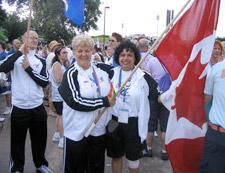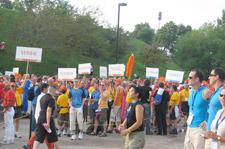
PROUD ATHLETES. Sally Jakabowski and Dee Paul, who play with the women's softball team the Toronto Storm, at the Outgames opening ceremonies in Montreal in 2006. Credit: Dee Paul
Many local athletes are once again having to choose between two international gay sporting events — the second World Outgames, taking place this summer in Copenhagen, Denmark, and the eighth Gay Games, scheduled for next summer in Cologne, Germany.
“If it’s financially sustainable to have the two games then I think it’s great,” says Eddie Coleman, a member of the Toronto Spartan Volleyball League (TSVL). “However I kind of question the sustainability and whether there is enough interest and enough money to do that.”
“I think having the Outgames and the Gay Games just one year apart like this is just not a good move,” says Dan Corby of the Canadian Gay Shinny Association. “There really should just be one event to start out with, because you’re just diluting the pool of people that are available to go.
In 2006, when the Outgames debuted in Montreal after splitting off from the Gay Games, the two events ran back to back, with the opening ceremony for the Outgames taking place within a week of the closing ceremonies for the Chicago Gay Games. That year proximity, nationalism, loyalty and a desire to support a reinvigorated gay sports movement were some of the many factors that played into Toronto-area athletes’ decisions.
“It was to support the movement to bring the games back to what it was originally: An event for the gay and lesbian community run by the gay and lesbian community,” says Valerie Austin, team captain for the women’s softball team the Toronto Storm, of the team’s decision to head to Montreal in 2006.
This time around financial considerations are a huge factor.
“In most cases it all comes down to money and I don’t think that in today’s world there’s many people who are in the position to be able to go to both,” says Corby. “There just isn’t enough financial backing out there for the leagues and the teams that go to these events.”
Corby says at least two teams — the Hogtown Boys and Toronto Reloaded — are planning to attend next year’s Gay Games.
“The primary reason in our mind for [the Hogtown Boys] going to Cologne over Copenhagen is that it’s going to take time for us to get enough money together to go to Cologne,” says Corby. “It was just too soon to go to Copenhagen, financially speaking, for most of the players. We’re looking to fundraise at least half of what it’s going to take for everybody to go and that’s going to take time to get that done.”
Corby estimates that it will cost $5,000 for each player to attend, including flights and accommodation. With 15 players on the team, “it’s a lot of money,” he says.
Austin, who is heading to Copenhagen with the Toronto Storm, says they’re looking at a base price of approximately $3,500 for airfare, accommodation and registration in the games. “Then if you want to eat drink and party you’ve got to find that too,” she adds.
For the Toronto Storm the decision to head to Copehagen was based on the player’s enjoyment of Montreal’s event.
“It really wasn’t a political decision,” says Austin. “We really enjoyed [Montreal’s Outgames], it was well done and we enjoyed the presentation Copenhagen gave in Montreal.”
For TSVL’s Antonio Arribas it makes more sense to go to Copenhagen, since he’s already planning to be spending time with his family in Spain this summer.
“For me it’s been a little bit easier because I’m going to be flying into Copenhagen from Spain… and it’s always much cheaper to fly within Europe,” he says.
Arribas, who competed in volleyball at the last Outgames and is playing tennis this time around, says the early registration incentive also played a part in his decision. “I took advantage of the early registration deal and signed up back in September or October so I got a discount on the prices.”
Arribas says he’s spoken to fellow athletes who say the cost of travel is what’s stopping them from taking part in either games.
“If airline companies would offer a package or a discount price, I think more people would be willing to participate in these types of events,” he says.
Coleman, who competed in the first Outgames in beach volleyball —for which he won a bronze medal — and outdoor volleyball, is planning to compete in Copenhagen this summer with a Montreal-based team.
“There are three reasons why I’m going to Copenhagen,” says Coleman. “First, it’s because it’s the first of the two games to take place. Secondly, there is a team from Montreal that’s going which is playing at the same level that I’m playing at… and the third reason is that I had a really great time in Montreal and I think they organized a really good event.”
Though he’s made the Outgames a priority where his budget is concerned, Coleman says that the financial situations facing many Toronto athletes makes it impossible for them to attend either event.
“What I would love to see is more corporate sponsors coming onboard… and more deals being offered to athletes in order to get to Copenhagen or Cologne,” says Coleman. “You’re already taking time off work and, because of the expense and effort involved, most people would want to stay the whole block of time. So what I would love to see is a body that would go to various organizations like Air Canada or Via Rail and try to secure corporate deals for athletes.”
But whether it’s the Gay Games or Outgames, local athletes say international queer sporting events offer athletes a unique experience to connect through sport.
“It was especially eye opening to see people from countries where being gay is illegal,” says Arribas, of his Outgames experience. “They were there risking their lives to participate and to be with people like themselves. So I think these games are very important because it gives these people a chance to open up… and be who they are.”
“Events like these allow people who play at a certain level to take it one step further,” says Coleman. “You see all different calibres and I saw stronger teams [at the Outgames] that I hadn’t seen before, which really pushed me.
“For people like me, who played at a higher level but didn’t get to experience an Olympics… that’s what was overwhelming. I kind of gave up on my dream because of money… and also because I struggled with being gay and at one point gave up my sport because of it.”

 Why you can trust Xtra
Why you can trust Xtra


